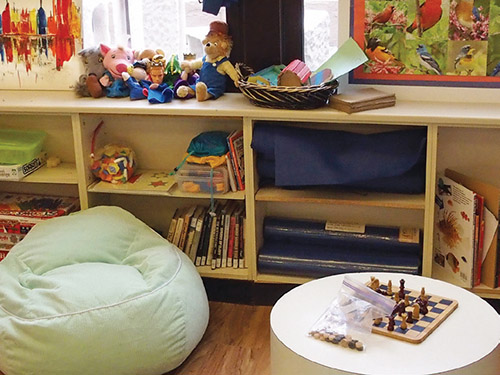

It’s lunchtime at the Moriah School. While most of the students are in the cafeteria, a few are having their meal in a very different place.
“My Space” is a room arranged with activity centers, tables and chairs, and places to relax. One to eight children at a time have lunch here at the recommendation of the guidance team or their teachers.
Yael Krumerman, school psychologist, said that many times during her 20 years of working with children she observed children being sent to the principal’s office who didn’t belong there. “While some were children who required discipline, others were students who needed a break from class for emotional reasons,” she said. “They ended up in the principal’s office because there was nowhere else to go. We started to think, how can we help them take a break from the day, relax a little, have lunch in a place that isn’t so overwhelming, and make friends in a more private setting?”
Krumerman, along with Tamar Edell, the lower school counselor, approached the administration about their idea; Odelia Danishefsky, lower school principal, said she immediately recognized the value. “The kids needed a healthy outlet where they could engage in mindful activities to relieve stress.”
Lunchtime is optimal for My Space; it’s a natural break in the day without compromising academics. Danishefsky said that the administration and guidance staff meet regularly with teachers to recommend students for My Space and plan who goes when and how often. Some come twice a week for a short time, others for the entire year. Each student is allowed to choose a friend to bring along.
“The room is also available throughout the day if needed for students who exhibit the need to be away from the classroom,” Edell added. “They are given attention to their immediate emotional need in a calm and non-threatening environment.”
The goal of My Space is not to provide therapy in the classic sense. “The therapeutic benefit is that it allows a relaxing break in the middle of the school day,” Krumerman said. “The children can release tension and stress while they recharge their batteries, so they are better prepared to move on with their day.”
“We don’t talk about what brought them here, but we listen,” said Edell. “The idea is to let children clear their minds.”
There are three rules for children at My Space: Eat your lunch, clean up and be kind to each other. After that, the children are allowed to do whatever activity they want. Or none. Kids can color, play with the child-sized basketball hoop, jump on the trampoline, string beads or stretch out on a bean bag chair. Krumerman, Edell and Jessica Zlatin, a speech language therapist, take turns supervising.
Parents sometimes clue the school in to their child’s need for help. When a parent was concerned about her child’s social integration, the guidance team recommended that the child come to My Space twice a week, and she came with different friends. “This allowed her to start building friendships in a supportive environment,” said Krumerman. “After two months, she was completely at ease.”
Danishefsky said My Space is Moriah’s unique creation. Other schools are sending representatives to visit and learn about it. The concept is deeply rooted in Moriah’s commitment to what is termed social emotional learning (SEL). SEL teaches children to recognize and understand their emotions, feel empathy, make decisions, and build and maintain relationships.
“Social emotional learning has become a critical part of children’s education,” said Danishefsky. “Moriah is known for its strong academic program. However, it is well established that when children are relaxed, there is a significant improvement in their focus, attention and ability to retain new information. Programs like My Space stem from our understanding that social emotional growth is equally important to us.”
Although there have been no formal assessments of My Space since it was introduced in 2016, anecdotal evidence indicates its effectiveness. “In the short time we have been utilizing it, we have seen incredible success in supporting many students and enabling them to thrive socially and emotionally,” said Rabbi Daniel Alter, head of school.
“The best way to assess My Space is to look at the kids, see their faces and how they’re functioning,” said Danishefsky. They are giving My Space an A plus.









